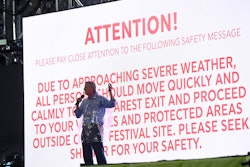
When Sean Pedeflous decided to launch his own company during the pandemic, he was eager to take on new clients. So, the San Diego-based owner of 32 North Design—an independent design studio specializing in experiential 3D renderings and exhibition booth displays—acknowledges he may not have done his due diligence when a company he'd never heard of reached out.
“I got on a call with them. The guy sounded legit, and they set me up with 1099 forms; I was excited,” Pedeflous remembers. “I did a bunch of work for them for two or three weeks before sending an invoice.”
He continued to work for them while waiting to be paid, but started getting frustrated by constant requests for quick turnarounds. Pedeflous started to get a weird feeling in the back of his mind—particularly when a loose mock-up he’d worked on was posted on the company’s webpage, without any approvals. “They were definitely using me for free work at that point,” he believes.
That’s when the increasingly elaborate excuses started—first a story about their credit cards being hacked, then saying they were waiting for an investment from the Middle East, and even once claiming they’d been involved in a school shooting. “These kinds of responses went on and on, and the excuses kept getting crazier,” Pedeflous recalls. When he’d call, he notes, he kept getting shuffled to different people at the company to discuss the issue—he believes it was often the same person faking a different voice, but can’t prove it—before he finally started threatening legal action.
“They only owed me about $3,500 so it wasn’t going to make or break my life—but as soon as I brought up legal representation, they got super aggressive and said they were going to countersue,” Pedeflous says. “Eventually, they paid me half of it. At that point, I just gave it up.”
Afterward, he started digging into the company more thoroughly—and noticing some red flags he’d missed. “There were no employees listed on LinkedIn, and when I asked around, nobody in my network had heard of them,” he explains. “On the company's Yelp page, some reviews said they’d ghosted clients on the day of the event. I think their scam was to get a deposit, pretend to do the work by outsourcing to people like me, and then disappear.”
If he could do it all over again, Pedeflous says he’d trust his gut more—“If there’s smoke, there’s usually fire,” he points out—and he’d do more research. “Utilize connections on LinkedIn,” he advises. “Do some Instagram investigation, and see what kinds of people are engaging with the company. Are they bots?”
Whether it’s a company scamming you into free labor, a ticketed event that misrepresents itself (Willy's Chocolate Experience, anyone?), or a sketchy email exchange intended to get your bank account details, scams in the event industry seem to be on the rise. According to Lee Dyson, event profs need to be extra vigilant right now.
“We have been providing DJ/emcee, sound, and lighting for 20 years and have never seen it this bad,” explains Dyson, the owner of Los Angeles-based company Hey Mister DJ, who notes that the wedding industry is particularly susceptible. “For several years, scammers did most of their trolling through vendor listing sites—mainly because listing sites allow a potential couple or client to send inquiries to multiple vendors at once or will enable them to fake a photographer’s profile easily. Now, scammers are reaching out to venues and vendors directly.”
He’s also seeing scammers directly contact unsuspecting couples and other event hosts. “The rise of online marketplaces has made it easier for fraudsters to create fake vendor profiles and lure in unsuspecting couples with attractive offers,” he says. “Additionally, the pressure to book popular venues and vendors quickly can lead couples to overlook warning signs and rush into agreements without thorough vetting.”
We chatted with Dyson and other event profs to learn some of the red flags they keep an eye out for.
1. Seeming too good to be true
If an inquiry seems unrealistic, it probably is. "One common red flag is an inquiry that appears too good to be true," notes Las Vegas-based event producer Christopher Knight. "Whether it's an extravagant budget for minimal services or unrealistic demands, such inquiries should trigger a cautious response." In short: Trust your instincts.2. Being too eager to book
This is when “they ask your pricing and then immediately say they want to book you with no questions,” explains Dyson. Knight agrees: "Beware of pressure tactics that create a false sense of urgency to make hasty decisions without proper consideration," he says.Always ensure every agreement is documented in a contract. Include clear terms about payment schedules, services provided, and cancellation policies.
3. Avoiding phone calls or other meetings
Another red flag? “They avoid calls by saying they are traveling, working overseas, or hearing impaired,” says Dyson, who shared more tips in a recent blog post on his website.Alicia Jenelle, the director of Toronto-based experiential event production company The Jenelle Group Inc., has observed something similar. "If a potential client insists on sending money before meeting virtually or face-to-face, it's a definite cause for concern," she says. "It's crucial to stay vigilant and trust your instincts in these situations."
4. Pushing for strange payment terms
"Another warning sign is the insistence on unconventional payment methods," notes Knight. "Scammers often prefer methods like wire transfers, cryptocurrency, or cashier's checks, which offer little to no recourse in case of fraud. Legitimate clients typically prefer standard payment methods like credit cards or bank transfers."Other warning signs Dyson has spotted? “They ask if they can give you a check for more than your asking rate, and have you help pay out another vendor on their behalf,” he says. Or, “They say that someone else (a boss, a friend, etc.) is paying for your services, or they emphasize too much and too early on how payment will work."
5. Having poor grammar and punctuation
Dyson is always cautious when "the initial inquiry is only one or two sentences, very brief, with no spacing or bad punctuation/grammar," he says. Or, "the inquiry email and client’s name don’t match up (though they are getting better at this)."6. Being hard to verify with outside sources
"I had potential clients who were eager to pay for my services without any prior meeting," remembers Jenelle. "They requested my proposal, which I promptly submitted. They quickly told me I won the business and even specified the venue for the event. However, when I contacted the venue to put a soft hold for the booking, I discovered that several other planners had also claimed to have won the business and were attempting to book the same venue. Talk about a major red flag!"Always do your due diligence on new clients. Use online resources, check reviews, or ask for references from past events they've hosted. “Ask them to give you the name of the sales manager at the venue so you can reach out to them,” Dyson suggests. “Call the venue (if they give you a legit venue name) and confirm they have booked this date. Ask for the name of the wedding/event planner so you can introduce yourself, or ask for a preliminary phone call with the bride/groom or corporate client, birthday guest, etc.”



![Pag 4571[3]](https://img.bizbash.com/files/base/bizbash/bzb/image/2024/06/PAG_4571_3_.665f33fa2b275.png?auto=format%2Ccompress&fit=crop&h=100&q=70&w=100)







![Pag 4571[3]](https://img.bizbash.com/files/base/bizbash/bzb/image/2024/06/PAG_4571_3_.665f33fa2b275.png?auto=format%2Ccompress&fit=crop&h=112&q=70&w=112)







